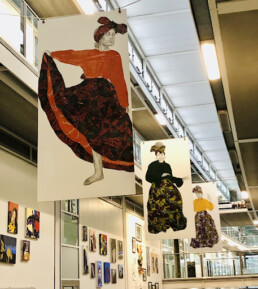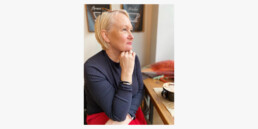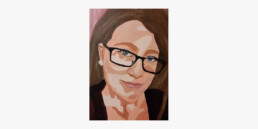What It's Also Like to Be a Teacher
This blog is reproduced here with permission. Written by Ian McDaid on his blog on 15th May 2023.
Preface from Emma
I’m constantly struck by the narratives around our profession and am acutely sensitive to how they play into the ongoing and serious recruitment and retention crisis in teaching. Whilst it’s important to call out poor practice and be honest about challenges, it is also essential that we remember that working with young people is a privilege and is frequently joyful and rewarding. I came across this blog during what feels like a particularly dark period in our profession, when something bordering on despair seemed to pervade my interactions and my social media and it was a poignant and essential reminder of how wonderful this job can be, despite everything.
What It's Also Like to Be a Teacher
“Good morning Sir, had a good weekend?” That was my first interaction with a pupil today. However it wasn’t the first interaction since leaving school on Friday. Over the weekend I received this:
“Hi sir, I just want to inform you that I will be going on holiday on Saturday 20th May so will be missing the last week of term. This is a one off holiday and I my attendance this year has been 100% so far.
My parents did inform the school on the 5th February with a leave of absence form, but I was unsure if the attendance team had informed you.
Do I have to let all my individual teachers know?
Kind regards, ********”
Day then continues with praising a form for their attendance last week, and bigging up all last week’s achievement points awarded.
First lesson of the day… a timetable rotation mix up. I’ve got a whole class of kids sitting in a room, books open and raring to go. It’s the wrong class! Off they trot to where they should be and the correct class arrive shortly after.
Parental email to respond to, querying a detention ending with the words “if this is the case you have my full support”.
Break duty, always tricky, but more positives to take away. What stood out was the politeness of the student who wanted access to the lift. Good manners always appreciated and make a huge difference. Also spoke to some Y11s who were positive about the RS GCSE they just sat.
Practical lesson with Y8. Engaging, happy hour, with loads of achievement points awarded for outstanding work. Yes, a few positive rule reminders needed, but that is the norm.
After lunch I see a student I teach looking anxious about attending a lesson. I acknowledge that she looks agitated, and tell her to take a few mins to compose herself. I’m thanked by her. Without kindness we have nothing in schools.
Last lesson of the day was the most challenging. An example of one or two students wanting to rule the airwaves. Yes, sanctions were applied, more than I’d like, but that is why systems exist – to support teachers so we can get on and teach. Take away from that lesson “is it as easy as this?”, says the previously sanctioned pupil!!
Let’s see what tomorrow brings… other than a fresh start for every pupil.
Image by Freepik
Muddy Waters
A guest blog by Aini Butt.
‘Do you have the patience to wait till your mud settles and water is clear? Can you remain unmoving till the right action arises by itself?’ Lao Tzu
No.
I often lack this ability to be patient and I believe that I may not be the only one who struggles with this romanticised version of patience.
Stillness of the body does not always equate to stillness of the mind; it is during the silences that the inner voices are no longer drowned out, and their echoes may confuse you.
Passive listening will only add to the confusion and waiting for the inner storm to pass will not guarantee a relief either. It is during these times of emotional turmoil that motivational quotes are thrown around like toxic sprinkles of positivity only to add to the frustration.
This does not mean that there is no wisdom in these words. On the contrary! These pearls are of profound value; however, when taken out of their spiritual context they can feel like empty shells.
It was during another futile attempt at practising stillness of the mind that I decided to go for a run instead. During the run, I saw many muddy puddles and I thought of Buddha’s saying,
‘The lotus flower blooms most beautifully from the deepest, thickest mud.’
My mind wandered to the past when this quote was a stimulus for reflection and an art piece.

Running along the muddy trail, my mind also raced from one thought to another. Until a small muddy puddle stopped me in my tracks, literally.
‘Muddy water, let stand, becomes clear.’ Lao Tzu
This whole time I had been trying to run around the mud only to realise that even muddy puddles have the ability to reflect the vast sky if only you change your angle. The pictures below show both the puddle and the reflection captured from a different angle:

A slight change to my angles allowed me to reflect the cloudy sky within this muddy water.
It was like an epiphany, arguably a long overdue one. This is when it all made sense! The growing frustration during those enforced moments of stillness followed by shame; the painful gaslighting of one’s own emotions. Until some much-needed, yet temporary, relief of the ‘muddy’ phase followed by a repeat of the same emotional cycle.
Racing my mind back to my muddy puddle, a change of perspective allowed me to understand that it was not the emotion itself that made me feel frustrated. It was the passive state of mind followed by inaction, which meant that this whole cycle of emotions was repeated over and over again. This is when my mind turned to Rumi’s words,
‘These pains you feel are messengers. Listen to them.’
When you experience physical symptoms of an illness, you don’t just ‘listen’ to them; you are required to make active attempts at pinpointing the cause and deal with its roots. The emotional turmoil you face at times may put you through inexplainable pain, one that you fail to describe or share with others. It is during these moments that being still seems like the only way to see it through. Although this may provide temporary relief, chances are that another storm is on the forecast.
A passive state of stillness alone will not cure these pains. So why do you expect your emotions to fade away or settle by merely allowing yourself to feel them? Are you expecting the flood of your emotions to drown you, and somehow by remaining still you will miraculously resurface?
You shame yourself when the underlying emotions muddy your waters despite all your efforts to keep them neatly tucked away and plough through your days. You continue to tell yourself that their resurfacing will only create unnecessary upheaval and some things, including some emotions, are better left buried.
What if you changed your perspective? Just like I did to capture the reflection within the muddy water. Maybe it is time for you to change the way you look at your emotionally turbulent times and allow the subconscious emotion to float to the surface, allow it to muddy your waters until you cannot deny it anymore.
As Rumi said,
'When someone beats a rug, the blows are not against the rug, but against the dust in it.’
In the same way, muddy waters serve a very important purpose. If you allowed the dust to settle back into the rug, the beating would have been of no use, similarly, passively waiting for your waters to become clear without appropriate action would be a missed opportunity for reflection upon the subconscious emotions.
The whole world has been made a source of reflection for you, even your muddy waters. Become a mirror to catch a glimpse of the depths of your emotions.
How Headship Broke My Heart
A guest blog by Sarah Hussey.
Preface by Emma Kell
Presenting to large groups of people is (and arguably, should always be) nausea-inducingly terrifying. My secret trick is to start by focusing in on a handful of key people: the one who exudes kindness and nods from the moment you introduce yourself, the one with the stubbornly straight face who you aim to win around, and the shrewd one who exudes the kind of wisdom that says, ‘I won’t take any crap, but I’m listening…’. Two years ago, in the Isle of Wight, Sarah was the latter. She’s the kind of person who exudes moral purpose and high standards – who inspires you to be the best version of yourself you can be. She’s the kind of person you want to go to the pub with and put the world to rights. I’ve since had the privilege of getting to know Sarah. She’s the kind of leader who makes me want to relocate so I can work with her; the kind of leader who eschews fads and polarities and embraces what works for her school and her community. She’s fiercely loyal to her team, wickedly funny, entirely lacking in ego and unapologetically authentic in her words and deeds.
During the months when I first got to know her, the ‘scabby pigeon’ in the corner of the ceiling (you can’t take your eyes off it because it might sh*t on you at any moment) was Ofsted. Sarah was frequently gung-ho about them – it’s our school and we know our community best and we know we’re doing a great job – but as she watched colleagues beaten down by inspections and the chant of ‘not good enough’ became louder and louder amongst fellow school leader she cared so much about, Sarah’s anxiety levels rose.
Ofsted came and went, as they eventually do, and it actually wasn’t as bad as she might have imagined.
Then, less than a month later, I received this text from Sarah
So looks like I am poorly after all. Have been in hospital since yesterday at 6pm and they want to transfer me to Queen Alexander hospital in Portsmouth as I have had a heart attack!!! I'll have to bloody rest now won't I? xxx
Sarah’s no longer in headship. The decision was taken out of her hands. Here’s her story.
Back in the summer of 2022, I wrote a blog for Emma Kell all about the ‘Joy of Headship’. I meant every word and I was looking forward to my 13th year of headship. It is now April 2023 and I have not been able to work since 1st December, plus I have handed in my notice for the end of the academic year. I am only 52! I often sit and wonder how I got here and if I could have done things differently. I am yet to come up with a definitive answer.
Let me talk you through the events and see if we can draw some conclusions.
Firstly, I need to make it clear that I have always loved my stressful but rewarding job, but something shifted in me this year and I was unable to switch off. Is it possible to care too much? The school is a good school; our team has worked bloody hard to ensure this and we were happy to show it off. However, stories of awful inspections were filtering down to me - through social media and then from fellow heads who had very recently been visited. I began to worry about our outcome; we were due any day and those worries became huge anxieties that I carried with me at all times. I have a history of depression and high blood pressure and I sought medical support with them both through October - but I was ‘fine!’
Ofsted called and visited us on 15th and 16th November (the same days as Caversham Primary, Ruth Perry’s school, which is not lost on me!) It was as I had been warned, a very different experience to the previous two I had led. The inspector had her views on the school before entering the building and there was a distinct lack of professional discussion. We retained our ‘good’, with a warning that they will be back in two years to check the things that weren’t ‘good enough.’ The outcome is not important though, it is the stress of the build up and the actual process that needs to be examined urgently.
A week prior to the inspection, my normally high blood pressure was even higher and I was prescribed extra medication to help bring it down. During the safeguarding ‘grilling’, my deputy and I watched my feet and ankles swell, reminiscent of Augustus Gloop! Another emergency GP phone call was made. By the end of the gruelling second day I was broken, I had barely slept and had been surviving on adrenalin only for 72 hours. The process was a constant battle, with my staff and I trying to prove how we knew the school was good and having the resilience to keep going. It was really tough - much tougher than it needed to be.
But hey Ofsted was done! I naively thought that once they had left the building I would feel joyous relief and be able to carry on where we left off. This time it was different. There were things that had been said, comments made in those two days that ate away at me. I had concerns about my brilliant staff and how they had coped; I felt like I hadn’t protected them enough. School life carried on, but it seemed to be even more stressful. We were dealing with some really challenging situations as all schools do and not enough time or money for staff to fulfil their roles effectively. For the first time in my role as headteacher, I felt that my staff were unhappy and wanted me to have all the answers - and I didn’t.
By the end of November, I was really struggling both mentally and physically. I decided to go on a school visit with my year 1 class and their wonderful, young teacher - I needed time out of my office and with some children (I barely remembered what they looked like). On the coach on the way home, I felt some mild chest pain and pins and needles in my left arm - I put it down to the fact that a little girl had fallen asleep on my arm!
The following day I had a particularly difficult meeting; I am normally really good at staying calm and seeing everyone's perspective - this meeting left me angry and frustrated (one of those where you sit in your office afterwards and cry angry tears!)
I called my GP the next day as I was feeling increasingly unwell and was told to go to A&E for an ECG, to be on the safe side. I really wasn’t sure where I would fit it into my day but I did manage to pop up at lunchtime, really not expecting what happened next. What followed was a period of morphine foggy conversations with different medical experts. I was admitted, discharged, admitted again and then told by a Cardiologist that I had experienced a string of cardiac events and that I was leading up to a huge heart attack - I know the clues were there but I was too busy and indispensable to listen to them. Did I mention that I am only 52?
I was then blue-lighted to the hovercraft, where I was stowed in the luggage bay with my own emergency team and taken to QA hospital in Portsmouth, it would have been exciting if I wasn’t so terrified! I then had a few days of bed rest and extensive investigations. I was finally discharged with a diagnosis of Acute Coronary Syndrome and more medication than my 81-year-old father has to take daily.
I am not recovered, physically or mentally, but I am getting there. I am attending Cardiac Rehabilitation (I am the youngest there), accessing mental health services and in a few days time will be travelling to London for a specialist cardiac MRI to see the scale of any damage done to my heart.
Do you know, I think I have read the Ofsted report a handful of times; it is so insignificant to me now. We really are replaceable at work - my school has continued without my presence.
My amazing GP is helping me to claim for ill health retirement from Teachers Pensions, this has been almost as stressful as the build up to an inspection and nowhere near sorted. It is a difficult process and you need to have your wits about you. My blood pressure is now deemed to be treatment resistant hypertension (I take four different medications all with different side effects for this alone) and I have a diagnosis of acute coronary syndrome, as well as depression and anxiety. However, if an Occupational Health expert decides that I will be fit for work again before pensionable age, I will not qualify for even the first tier of ill health retirement. The first report they wrote was so factually incorrect and badly written that I had to make a complaint to get an apology and a rewritten report. The doctor who saw me over Zoom for twenty minutes described in the report that I had a physical reaction to the ‘perceived stress’ of my job. In a time when colleague heads have taken their own lives I would like to think that other professionals would acknowledge our stress as very real. In our interview I was asked; if the governors could remove Ofsted inspections, a lack of budget, challenging families and leading a team of staff, did I think I would be able to do my job? Oh the irony!
So what do you think? Can we make any connections between my health and my role as Headteacher? I don’t think it needs to be spelt out, does it?
Schools need and value a system of accountability, but the current system is toxic. Education in this country is broken, we are undervalued and our concerns are dismissed - remember we are the sector that stayed at home during the pandemic. There will be no experienced headteachers left if this continues. Sadly, despite all the amazing things I have achieved in my career, I have been left with an overwhelming feeling that I have failed. No job should put your body under so much stress that it drastically affects, not just your quality, but the length of your life.
Change must happen!
Shards
A guest blog by Aini Butt.
You seek validation from the mirror,
a forced smile to please its reflection.
Your tears blurring your vision,
a forceful flood thirsting for its affection.
You work tirelessly, pushing all your doubts and fears aside, towards that romanticised image – the perfect depiction of success and happiness. When you pause to reflect, whether that is by choice or a grinding halt forced upon you, holding your breath before you open your eyes and gaze upon your reflection in the mirror. It's not what you had expected...
You see yourself as a failure when your mirror doesn't show what you had envisaged. You close your eyes. As you open them again, you look at the mirror hoping that the forced smile will somehow make it all better. But you forget, that it is not a mirror's job to entertain your desires; its reflection does not lie – and it will not lie to please you.
These are the struggles that we face when we have developed the ability to reflect, but the years of trauma do not allow us to practise self-compassion and accept our true reflection. Whether it be the result of generational curses, societal standards, toxic relationships, we hold ourselves and our image at ransom against unrealistic expectations.
One of these unattainable standards has been perfectionism, which I'm unlearning through my art. I have been trying different art media for a while now and have had some that turned out a lot better than expected. Despite the harsh criticism from within, they were seen as good enough attempts and deemed worthy of sharing with others.

These are the leftovers of an art piece I was working on. I tried something new and it didn't work out; not being able to face this failure during an already difficult time, I didn't have to think twice and it ended up in the bin.
Sat there at my desk still struggling to write in my journal, it dawned on me that I was still trying to escape those things that hadn't gone to plan. In the process of this desire to discard any evidence of my failures, I was trying to escape the lessons. Maybe because I'm tired of the lessons and the hurt that comes with them – every time!
I took the art out of the bin and tried to rip it up. Yes, it was anger and frustration, but allowing this emotion to flow through my body was the only thing that was within my control, even if for a moment it seemed like I was losing it. When I realised that I couldn't rip the Yupo paper, tears of frustration rolled down my cheeks. I grabbed the scissors and started cutting into the already-ruined art piece. When I had finally cut it into several pieces, I closed my eyes and sunk back into my chair. Looking at the pieces lying in front of me, the desk light shone its light on one of the smaller ones; the metallic gold shimmered, maybe even more so than when it was part of the whole picture.
All I could see was the glistening beauty of that small piece, which was part of my failure. In that moment, I forgot that I had failed to depict the image I'd had in my mind. I knew that going back to the same image was now impossible after cutting it into pieces. Even with the best efforts, I would not be able to recreate alcohol ink design in an identical way. I stuck the pieces into my journal and filled the gaps with gold foil.
Is that what we are meant to do when life breaks us apart and that desired reflection in the mirror is shattered into smithereens?
Sometimes we need to accept that the image we were working towards has been destroyed and it is only when we practise self-love and self-compassion that we will be able to see the glistening beauty of our shards.
My Response to the Plan
A guest blog by Abigail Gray.
The day before the new SEND Improvement plan was published, I was at the Outstanding Schools Conference at County Hall with leaders of international schools. There were delegates there from all over the world: India, Ukraine, Greece, The Netherlands, France, Dubai and, of course, the UK.
My good friend Louise Dawson, a passionate advocate for inclusion and an international SEND consultant, had invited me to her session on putting SEND policy into practice. It involved a hilarious pass the parcel activity, but typical of a great SEND practitioner, there was deep intent in the fun. There were presents but also questions instead of forfeits. School leaders quickly began an animated conversation about the challenge and opportunity of an inclusive school. What are the things we need to change? What needs are hardest to meet in the classroom? How do we fund effective support? What is included in our universal offer? How do we meet and manage expectations? This list went on.
One of the words that Louise used repeatedly in her presentation was ‘intentional’. She made it clear that inclusion doesn’t happen by accident, it happens by design. I think she’s completely spot on.
It’s long been my observation that no new plan, no law, no regulation, guidance or policy enacts itself. Writing it down doesn’t make it so. It takes people to do that.
It takes people to firstly be aware of what it is that they need to do, then work out how it might best be done. It takes action and courage and stamina and commitment. It takes personal and professional integrity. Every head teacher, every local authority officer, every teaching assistant, every teacher, every educational psychologist, every one that makes it happen. All of us.
All this talk of transformational plans, while the transformation yet to take place in education is the one that genuinely places children with SEND at the heart of what we do. At the heart of our inspection frameworks, our performance measures, our planning, our pay spine, our conscience. Not only do we need to be absolutely clear in understanding our obligations but, as Louise rightly says, of our intentions.
It’s always very clear to me when this has happened in a school. When a school gets it right for children with SEND, everybody benefits.
There is a sense of ownership and pride in the relationships that exist with families and children.
There is an understanding of the law and its importance in protecting the rights of the most vulnerable.
There is a willingness to listen to all feedback.
There are opportunities to try and sometimes to fail in pursuit of something better.
There is a shared belief that all children can achieve and thrive at school.
There’s a transparent approach to funding for SEND and to establishing value for money.
There is realism in recognising the limitations of both people and resources.
There is a genuine interest in staff well-being and development.
The graduated approach, we hear so much about for students, is in place for us and our own systems.
There is collaboration.
There is laughter.
There is success.
I know. I’ve been there and it was great.
A Day in the Life of a Happy Vice Principal
A guest blog by Madeleine Fresko-Brown.
There’s a lot of negativity in discourse around education at the moment. Times are tough, and it can be hard to work in a system you know is not working well for every child or every adult involved. But it is possible to be happy in this job!
Just in case anyone was doubting, it is possible to work in a comprehensive secondary school in the UK in 2022 and be really happy 😊 #edutwitter @thosethatcan
— Madeleine X F-B (@M_X_F) November 1, 2022
I’m a new vice principal of a large, busy inner London secondary academy. Here are some of the things which give me satisfaction, fulfilment, and yes, happiness at work.

1. Walking into my school and taking in the excellent student art adorning the walls and the high spaces. Our art department scored in the top 1% in the country for the UAL extended diploma, and you can see why! I brought my family (both my parents and my children) to the art show because I wanted to show it off – not that it had anything to do with me at all. But how lucky am I to work in a place like this?

2. Morning gate duty. Seeing the faces of our year 7 & 8s in the morning, saying good morning with a smile, them politely saying good morning back. It’s always good to be able to connect with some of the ‘trickier’ students in a positive way first thing, before anything has gone wrong
3. Line management meetings. Perhaps some groan at the prospect of these, but I really enjoy them! I meet with the principal (my line manager) and everyone I line manage weekly. It takes up a lot of time (2 almost full days of my timetable devoted to this) but it’s worth it. Having a good chunk of time with the principal means I can always run ideas by her, get her wisdom and the longer view of her experience of the school, as I am still quite new. Each person I line manage comes prepared with questions and things to discuss – sometimes small, sometimes big. As a teacher I am by nature interested in people’s development, be they adults or children, and I consider it a privilege to be part of my colleagues’ journeys as they work out how to do their jobs to the best of their ability, and reflect thoughtfully when things don’t quite go their way. Now I’m a Vice Principal, I am managing more senior colleagues (3 assistant principles, the SENDCO, and a Curriculum Area Lead) as well as meeting the DEI (Diversity, Equity & Inclusion) lead and Induction Tutor on a regular basis. As each of these people bring a wealth of experience to their roles, I always feel I have plenty to learn from them while coaching them to achieve their visions. This makes me happy.
4. Teaching! We tend to get less and less time in the classroom as we progress through senior leadership, which is necessary but can be sad. I very much enjoy the classroom time I do get- this year with year 11 and year 13. I always find the connection I have with pupils in my own classroom feels so much stronger than with pupils I only interact with on corridors. Once I’ve taught a child, even if only for a few weeks, I feel I ‘know’ them and they know me.
5. Learning walks/observations/lesson walkabouts. As a ‘teaching & learning’ person, I love popping into lessons the most. I wish I found more time for it but I make sure I do it informally once a week and offer positive praise on a postcard. I even popped into some senior colleagues this week who seemed to quite like receiving a postcard themselves! Longer, more formal observations are also really enjoyable, as are the feedback conversations afterwards where colleagues show a genuine desire to reflect and improve.
6. Coaching. Every teacher in this school has a period allocated for coaching, and every member of support staff also has peer coaching as part of their CPD programme. It’s pretty amazing. I am paired with the other VP for coaching and it’s a great space to be able to come together and listen to each other. We’ve been trained on a couple of models and we don’t always manage to stick to them religiously, but the space is there and we both know it’s for listening, probing, and developing, which at different points has helped us both a lot. We also adopt a coaching approach in our line management meetings, which avoids the feeling of coming out of a meeting feeling like you’ve been told what to do.
7. Weekly Teaching & Learning meeting with middle leaders. Every week the senior leaders responsible for teaching & learning, curriculum directors and curriculum area leaders (CALS) meet to discuss our priorities, progress, next steps, feedback and more. I enjoy chairing these meetings. The directors and CALS are a thoughtful and honest bunch, and help keep the senior team in check, lest we suggest something that has been tried and failed before, or would be an unreasonable workload burden. As well as giving us valuable feedback, I hope the middle leaders feel that the meetings help them to develop, both in their understanding of whole school considerations, and in thinking through strategy for their own departments in collaboration with others.
8. I love leading CPD, facilitating others to lead, and the feedback from colleagues. At a recent short CPD session entitled ‘every minute counts,’ I invited several colleagues to share tips for saving minutes in a lesson. Suggestions included using stopwatches on the board, carefully numbering books and chairs and handing them out in a perfect order, the importance of a teacher being silent during the silent Do Now, modelling using a visualiser, mini whiteboard AfL, and more. I gained happiness from seeing how thoughtful and effective my colleagues are when they really think about their practice. Leading DEI (Diversity, Equity, Inclusion) CPD on LGBTQ+ inclusion with a colleague was also a very memorable moment from which I came out buzzing. One colleague bravely shared his experiences of transitioning, and everyone engaged so thoughtfully with scripts we had prepared on how to respond to certain comments/situations.
9. I like the structure and routines of our leadership meetings: we have a ‘rolling chair’ so each member of the team has the experience of chairing (mainly preparing the agenda, timekeeping and the important role of bringing snacks!) We always start with an ‘opening round’ of something positive from our week – often bringing lots of shout outs for colleagues, and ‘something educational’ where the chair brings something for us to read/watch/discuss and learn from. I appreciate that we prioritise continual professional development for our team through this routine. My colleague and I also deliver extra DEI training to the SLT on a regular basis, which is a rewarding and enjoyable experience.
10. Going home. Yes I love my job and I also love leaving it at the end of a day! On Mondays, I prioritise my physical and mental wellbeing by going to yoga (in school as part of the wellbeing offer) and then a gym class. On Tuesdays I leave late because of leadership meetings (finishing at 6.15. At my first school, SLT would regularly be in school until 7.30pm and later). Other days I leave at a reasonable time and take my 2 kids to their swimming lesson or pick them up from after school club. Evenings I’ll often work, and often until quite late (10.30pm is not unusual) but given I only start this after the kids are in bed and I’ve eaten, this doesn’t feel unreasonable. I get my most productive work (and almost all my lesson planning) done in the evening as there are fewer interruptions. Although I do need to work most evenings, I won’t turn down a social arrangement if the opportunity arises. Last week I went to dinner with a friend and next week I’m going to the theatre. The work will get done at some point!
That concludes my round up of the things that make up the main chunks of my time as a happy senior leader. I haven’t mentioned small but important things: little conversations, smiles, or sympathetic looks exchanged with colleagues, which remind me that we’re in this together and working towards the same goal. The way a year team leader or assistant year team leader will step in to help if I’m struggling to get through to a student. Getting to know support staff, some of whom have been at the school for over 20 years and really seen it all! Interviewing year 6 students joining us next year, or year 8 students selecting their options, meeting parents and carers at parents’ evening and open evening. Seeing SEND students looking after the two chickens we adopted, reading the school newsletter and attempting to process the vast number of things that happen in this institution, watching the students play a sports match (I haven’t done enough of this yet). Welcoming year 5 and 6 students for science workshops, arts days, sports events, watching the school production, the staff panto, the student band who practise in a science lab with their trombone, trumpet and flute! I could go on.
As for challenges? Yes they exist. My school has been through some major tragedies and should one of these occur while I’m in post, no doubt it will be an incredibly difficult time. But when it comes to smaller, ‘everyday’ challenges, much of happiness comes down to mindset and I find myself in a mindset where a challenge is a learning opportunity, not something to stress over. There are never enough hours in the day, no matter what your position in a school. I prioritise things that affect other people (colleagues, students, parents) and things I know I will be held accountable for. At times I wish I was doing more, but I know my limits and know that sustainability is important for me and my colleagues.
Above all, knowing I’m in a place with people who have the same goals as me – to do the very best for the young people in our care, to help them make the best progress they can and secure sparkling futures – is what makes the difference, and what keeps me smiling (almost) every day.
Holding Your Breath Until Wednesday Lunchtime
A guest blog by a headteacher who wishes to remain anonymous.
As a school leader I read lots of tweets and talk to lots of colleagues about the immense stress we are under whilst waiting for Wednesday lunchtime when your school is in the OFSTED window. Some of the tweets are very amusing and you can relate to them and have a chuckle and it is true that you can hear a collective sigh of relief run through my school at around 2pm on a Wednesday when we all realise we are safe for another week. However, the reality for many of us is very worrying.
I have been a Head Teacher for 12 years, I am no ‘inspection virgin’ and I can hold my own in a professional dialogue about my school and our context. I haven’t always felt this absolute dread at the thought of anyone coming in to judge our learning – in fact I used to look forward to it as an opportunity to show what we are doing and to learn some improvement strategies. Sadly, I am not even sure that I can pinpoint the exact moment this started to change for myself and colleague heads. The latest OFSTED framework, when it was published, was my favourite (I realise how sad it is to admit that you have a favourite framework!). I have always been enormously proud of the fact that we did not narrow our curriculum, that we offered a broad and balanced diet for all our children, even our year 6 pupils. We have always been focused on health and well-being, we run forest schools on site 3-4 times a week, we have a wonderful school dog, and ELSA room that is used every day for a wide range of children. We achieved a good inspection 5 years ago and until recently I honestly believed that our school is better now than it was then.
SO WHAT THE HELL HAS CHANGED?
The region where I work has just been named as the lowest achieving local authority in the country for GCSEs and A-Levels; I suspect our Key Stage 2 results are about to say the same thing. As a school leader I know that this is not good enough and something needs to change. However, we also have the highest number of SEND pupils per LA, yet we have the lowest specialist provision. We have huge numbers of children in mainstream schools that are being failed though a lack of resources. Everyone I know who works in education in this area is working to capacity – we can do no more. However, the inspections that have taken place in this authority in recent weeks in ‘good’ schools have been described as brutal by staff and governors that were involved. It seems that OFSTED would like us all to teach to a preferred phonic scheme with a preferred teaching style and every curriculum subject should be taught through a ‘bought in’ scheme, where your poor subject leaders (who probably get half a day a term if they are lucky) are expected to know what the progression and skills look like from age 4 to 11. In all of the negative feedback that heads have shared with me, the most disheartening thing is that there was no professional dialogue – staff were stopped in their tracks when talking about their provision. There were no opportunities to provide more evidence on the second day of the inspection – decisions were made very quickly and the inspectors were ‘not for turning’. This is very different to both inspections I have undergone as a leader – one that judged us as RI and the second one as good. I am worried this new ‘brutal’ system is the new inspection framework and in a world where Head Teachers are not staying in post beyond 5 years, and teacher recruitment is at an all-time low, how are we ever going to make a difference in children’s lives?
For some time I have known the system is broken – yet often speak about the joys of school leadership - and so now I feel like a hypocrite! But it has to be said and to a wider audience than our Chair of Governors when we are having a moment. My blood pressure is currently sitting at 160/106 and my GP has told me to relax! I am of course in school, the time is 11:15 and I am holding my breath!
Image by Freepik
The Reality of Life as a Woman with ADHD
A guest blog by Krystina Cheshire.
I have such a fear of letting people down. Sometimes I feel like I'm seen as a problem by other people because I am different, and I hate that. The reality is I don't think or feel the same, I can’t focus in the same way and what motivates me is different. I lead with my emotions and they dictate what I do. I am different and society doesn't react well to anything that's different. The battles I face every day are also not the same and therefore I feel other people can't relate or don't understand me. In order to understand something, you have to first learn about it to know it. When people don't know about something they tend to judge. Judging leads to criticism and a lack of compassion which can lead to a breakdown in relationships. Positive relationships are fundamental to a happy and healthy life and so a change is needed.
When we hear the term Attention Deficit Hyperactivity Disorder or ADHD, quite often we find that we imagine a young boy who can not concentrate and is bouncing off the walls, fidgety, forgetful, highly energetic, argumentative and generally just difficult to manage. In the UK between 2% and 5% of school aged children are considered to have ADHD, although the actual figure is thought to be much higher if we think of the children who go undiagnosed. This tends to be the case particularly for girls. This is mainly due to girls exhibiting their ADHD traits differently or being able to mask their symptoms, particularly if they also suffer with anxiety. When the diagnostic criteria was created to assess ADHD they focused on male symptoms, making it harder to be diagnosed as a female and also ignoring certain symptoms which, while prevalent in many individuals with ADHD, are not even on the criteria. Many people don’t realise that ADHD is a life long neurodevelopmental condition. It is something you are born with. It is genetic. There are physical differences in the brain and how it works that cause individuals with ADHD to think, feel, interpret and react to things differently. It is not a choice or something they can control. For many individuals with ADHD, their symptoms become easier to manage and less obvious as they enter adulthood, simply because they have learned to adapt. At this point their symptoms may no longer have a significant impact on how they live their life and it would seem their ADHD has disappeared. However, ADHD statistics UK estimates that between 3% and 4% of adults have ADHD and many of these individuals will not have a formal diagnosis. A rise in awareness and understanding of ADHD has led to an increase in diagnosis, particularly in women. I am one of those women.
I had a good upbringing and was well cared for growing up. As a child I was shy, lacking in confidence and self-esteem, but I loved art and music and anything creative. I did not have many friends and I never really understood why. I was bullied throughout most of my primary and secondary education and experienced a lot of social anxiety. I was so anxious about getting into trouble or disappointing those around me that I often bit my tongue and kept my thoughts to myself while going along with things, especially in school. When I didn’t hold it in or if I spoke my mind, things did not go well for me. I was a people pleaser and wanted to make my parents and teachers proud. As a result, I was no trouble at school. I achieved academically, always did my homework, learned how to manage my time so I was always early for everything out of fear of being late. I would pack, check and double check my school bag to ensure I never forgot anything. I hated being anywhere new or trying anything new. The only criticism I ever got was for not putting my hand up in class and for not believing in myself. I was also constantly apologising for things that were not always my fault or within my control. People would describe me as polite, mature, sensible, responsible, too serious and very sensitive with a tendency to become overwhelmed and stressed. I struggled with emotional regulation and felt every emotion very intensely which caused issues in my relationships and gave me very hard and steep learning curves. I never needed as much attention as those around me, because I was always ‘OK’, and therefore I felt I didn’t get much.

As I entered adulthood I appeared to be doing well. On the outside people would see a woman who was on it, super organised and efficient, helpful and agreeable. You wouldn’t think there was a problem. But inside I suffered deeply with insecurities, anxiety and overthinking. Perfectionism is exhausting. Living my life in fear of how others would perceive me if I failed or didn't live up to their expectations. As a result, I got to my 30s, I seemed to have the perfect life, a husband, a home, two beautiful children who mean everything to me and my career that I am very passionate about. But I was deeply unhappy and I didn't have a clue who I was and what I wanted. I had done the set routine to achieve the standard life goals yet did not feel happy.
I'd spent so long thinking about others, agreeing just to avoid conflict and putting my own wants and needs last that I found my mental and physical health falling apart. As the woman of the house there is an expectation that you've got it all covered. If anyone needs anything they'll ask you where it is and if something isn't done, they'll ask you why you haven't done it or get grumpy or annoyed that it's not been done as if they had no responsibility over it at all. Fulfilling the roles of mother, wife, daughter, teacher is exhausting, especially when you feel that you’ve lost yourself as an individual. My life had become no more than the roles I played. I was living to serve others. I was not living. This intensified my ADHD symptoms to a point where I was no longer coping. As an undiagnosed adult at this point, I had no idea that the struggles I was having were due to my ADHD and so I felt like a failure. Why were other mothers, wives, teachers managing life while I couldn’t. Under the increasing expectations and responsibilities that had become my life I felt like I was falling apart. My memory was being affected, I was getting less sleep, I experienced sudden episodes of anxiety, panic attacks, nightmares and flashbacks. I was becoming more argumentative and confrontational and experienced bouts of depression and would have days where I just couldn’t help myself but cry – yet I couldn’t explain why I was crying. I was so tired and was struggling to get through each day and my relationships broke down.
I had become so used to saying yes that despite the above, it still felt uncomfortable to say no. The few times that I did took a vast amount of courage and was often met with shock, disbelief and caused conflict. As a risk averse person, this is so uncomfortable, so it is easier to just agree or stay quiet. I found myself mentally crumbling under the weight of societal expectations and responsibilities that life has given me. I got through each day but I was just going through the motions.
However, during this time of struggle I did find some relief. After my daughter’s ADHD diagnosis I learned as much as I could about it, the science behind it, how it affected the brain and how it presented and affected females. Through this research I found that I could relate, not just to one or two symptoms, but many. I sought an assessment and after a year of waiting I was diagnosed with ADHD. I was surprised that I met the hyperactive criteria during my assessment, but I learned that hyperactivity can also be hyperactivity of the mind. It does not always present in a physically outward way. People with ADHD, and females in particular can also experience Rejection Sensitivity Dysphoria (RSD) which causes extreme sensitivity to perceived or real rejection or criticism. Suddenly, so many parts of my life made sense and I felt a huge sense of relief. Now, I could start to look at my symptoms and the things I was struggling with through a different lens and the beauty was, now I knew the cause I could find the solutions. Nothing is going to take these symptoms away but I can now apply strategies and a different mindset to help me cope better. Now I know why I experience the things that I do, I don’t feel as anxious to talk about them. Once I started talking about them I felt less weight on my shoulders.

While I have highlighted various challenges I have faced in my life due to my then undiagnosed ADHD symptoms, I do also wish to highlight the many benefits that I would not change. I crave stimulation, otherwise I get bored. This has been a gift in my career as a teacher and is beneficial in many other aspects of my life. The strategies I use to mask and adapt for the benefit of others means I can get on well with a range of personality types in all sorts of situations. I'm curious and seek excitement. I am incredibly passionate about the people I care about and my interests. In these situations I can hyperfocus, maintaining concentration and staying motivated and on tasks for hours and hours without stopping or losing interest. When I am passionate about what I am doing I am unstoppable. I feel emotions intensely and I am attuned to the feelings of others making me incredibly empathetic. My perfectionism means I am always striving to do better and that means I am constantly going through personal growth and self-reflection. My hyperactive mind can be my worst enemy but it is also my biggest strength as I am a problem fixer. My fear of forgetting or messing up means I can become hyper organised. Individuals with ADHD are creative problem solvers, and we are the best people at coming up with strategies on how to best help ourselves and others like us. Quite often, what works for us also works for others. Listen to us. Value us. Respect us. We can offer so much if we are given the space and freedom to work in the way our brains are designed to work.
I am still learning about my own ADHD and how it impacts my life. It will be a lifelong learning experience, but one thing is for sure, I will no longer be quiet or apologetic for who I am. It is time to start being me.
Having It All
A guest blog by Kerry Rice.
Mums can't have it all, yet we continue to try.... to work like we don't have children and parent like we don't have jobs. When I was engrossed in celebratory end of year reports, my son, Cruz, penned a letter wishing for more attention from me. At school, a student criticised me for taking a shortcut when creating a lesson resource - a cheat I wouldn't have used prior to becoming a mum. Yes, I chose to become a working parent but this isn’t the dream I was sold. I love my job and love my son even more but I’d hoped for a throuple, not a love triangle.
Each day I have to decide which balls I'm going to let drop; which plates I'll no longer keep spinning, and hope that I have a big enough broom to sweep the broken pieces away; the shards of self doubt and splinters of shame. 'Mum guilt' isn't an imaginative name but the person who coined the term was probably a working mum saving time by opting for the obvious so they could help their child with their homework.
I know that I’m lucky to have a job which allows me to do 3 out of 5 school pick ups, reducing my childcare costs and enabling me to take Cruz to after school activities. But, despite what is often portrayed, a teacher’s day is not from 8 ‘til 3. So I wake up at 5am to plan and prepare, and mark students’ work on a clipboard interrupted by cries of, “Mummy, you weren’t watching!”
My son's asleep right now. It's the weekend but I want to plan a class trip. Perhaps I should be doing it now before he wakes but then I wouldn't be able to mention 'me'. Always the add-on, as if my needs no longer matter. Apparently taking a shower is self care and reading a book is a treat. When did completing basic tasks become something to celebrate?
I'm not sure how 'having it all' came to be. No longer the dream of dissatisfied housewives, it's the expectation for most. And I am clueless as to how it will change because, despite my rants and tears, I still aspire to be both a perfect parent and excellent educator. I know it's impossible yet I try. I continue on my quest to achieve the unachievable, continue to accept the obstacles and injuries. There's only one major casualty in this mission though...me!
A Tale of Two Ofsteds
An anonymous guest blog.
In the last 12 months I have had the pleasure (not always) of working in two comparable schools within the same local authority. Both schools, of similar size, face challenges based on the area they serve and the deprivation of their cohorts. Similarly, both schools have recently undergone Ofsted inspections and unfortunately on paper they are both graded the same.
It is in this respect that they are not comparable.
One of these schools is still promoting outdated pedagogical practice and using learning walks and book looks to terrorise and intimidate staff. Particularly when the most feedback ever given to a group of books is 'Why haven't you differentiated the task 5 ways in your lessons?'
In addition, practices such as printing out your planning every week to display in your classroom, ensuring your displays are all triple backed, triple marking every single book every day and not once providing CPD in staff meetings and INSETs were just accepted as normal. Teacher mental health and wellbeing was not mentioned and I was once in a situation with a senior leader where it was actively dismissed. All of this before you even start to unpick curriculum design, sequencing and intent. Needless to say, it was thin in all areas and in many non-existent.
In complete contrast, School 2 has invested serious energy and time into teaching and learning with weekly staff development sessions, a coherent and consistent curriculum threaded through with actual evidence and research and clear explanations for decisions being made and followed through. Staff are supported; their time protected and decisions made so that even when expectations are high, workload can still be manageable. The culture at this school is quite frankly, refreshing. People have professional discussions and engage in their practice on a deep level with a focus on achieving high outcomes and experiences for the pupils. Every decision is carefully crafted and has strong fidelity to the core vision and values running through the school. Most notably, staff well being is acknowledged and there is no culture of ‘it’s a tough job, you just have to turn up’.
Don't for a moment think that I am claiming perfection for School 2 as that would be frankly naive but the difference is extraordinary when compared to School 1. With Ofsted looming, the message from School 1 was 'do more on your displays, marking and make your lessons jazzy'. Staff were required to have Ofsted ready lessons for the moment the call came. School 2 was required to carry on with showing what we do on a day to day basis. It was still stressful and exhausting but in no way was it insincere or disingenuous.
In School 1 a weekly staff meeting was billed as ‘CPD’ and staff were asked to create a mood board in their year group teams. All of this the night before a ‘mocksted’ and needless to say said mood boards languished at the back of cupboards proving to have little impact on students or staff development. In School 2, weekly staff meetings are focused on a specific area identified to impact pupil outcomes. For example using the EEF and other sources to identify what effective feedback is and how teachers can use this practically in lessons. This short summation above does not even do justice to the complexity and depth of the CPD delivered in practice over a number of weeks.
My question is: then how can these two schools be graded the same? School 1 had one inspector for 2 days and has a thin report of two pages stating it is 'good'. School 2 had 3 inspectors who were still there at 6.30pm on day 2 meeting with leaders and was also rated 'good'. The two are not comparable. Not comparable by the experience of staff working there, nor by the pupils turning up each day. Not by the parents and community surrounding it or the curriculum delivered.
There is so much dialogue around accountability and Ofsted ‘ramping up inspection rates’ but in essence if we are not using the same rigour we expect teachers to apply in their teaching to the inspections of such are we not just permitting poor practice to continue unchallenged? I, for one, have escaped the tortuous delivery of VAK learning styles needing to be incorporated in every lesson but if Ofsted perceive that as ‘good’ then there must be others still drowning.
Image by fabrikasimf on Freepik.











